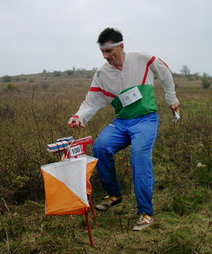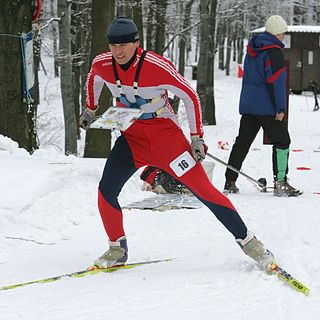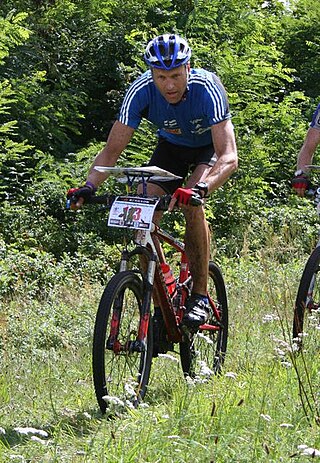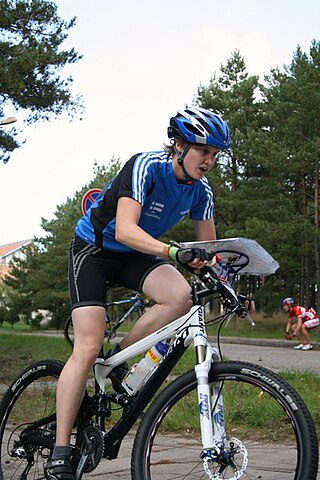
Orienteering is a group of sports that involve using a map and compass to navigate from point to point in diverse and usually unfamiliar terrain whilst moving at speed. Participants are given a topographical map, usually a specially prepared orienteering map, which they use to find control points. Originally a training exercise in land navigation for military officers, orienteering has developed many variations. Among these, the oldest and the most popular is foot orienteering. For the purposes of this article, foot orienteering serves as a point of departure for discussion of all other variations, but almost any sport that involves racing against a clock and requires navigation with a map is a type of orienteering.

Mountain bike racing is the competitive cycle sport discipline of mountain biking held on off-road terrain. The Union Cycliste Internationale (UCI) recognised the discipline relatively late in 1990, when it sanctioned the world championships in Durango, Colorado. The first UCI Mountain Bike World Cup series took place in 1988. Its nine-race circuit covered two continents—Europe and North America—and was sponsored by Grundig. Cross-country racing was the only World Cup sport at this time. In 1993, a six-event downhill World Cup was introduced. In 1996, cross-country mountain biking events were added to the Olympic Games. In 2006, cross-country mountain biking events became part of the World Deaf Cycling Championships for the first time in San Francisco, USA.

Amateur radio direction finding is an amateur racing sport that combines radio direction finding with the map and compass skills of orienteering. It is a timed race in which individual competitors use a topographic map, a magnetic compass and radio direction finding apparatus to navigate through diverse wooded terrain while searching for radio transmitters. The rules of the sport and international competitions are organized by the International Amateur Radio Union. The sport has been most popular in Eastern Europe, Russia, and China, where it was often used in the physical education programs in schools.

Ski orienteering (SkiO) is a cross-country skiing endurance winter racing sport and one of the four orienteering disciplines recognized by the IOF. A successful ski orienteer combines high physical endurance, strength and excellent technical skiing skills with the ability to navigate and make the best route choices while skiing at a high speed.

Trail orienteering (TrailO) is an orienteering sport that involves precise reading of an orienteering map and the corresponding terrain. Trail orienteers must identify, in the terrain and in the presence of decoys, control points shown on the map. TrailO involves navigation skills but unlike most other forms of orienteering, it involves no point to point racing and little or no route choice. It is conducted usually on trails and because the objective is accuracy, not the speed of physical movement, the sport is accessible to physically disabled competitors on equal terms as able-bodied.

A control point is a marked waypoint used in orienteering and related sports such as rogaining and adventure racing. It is located in the competition area; marked both on an orienteering map and in the terrain, and described on a control description sheet. The control point must be identifiable on the map and on the ground. A control point has three components: a high visibility item, known as a flag or kite; an identifier, known as a control code; and a recording mechanism for contestants to record proof that they visited the control point. The control point is usually temporary, except on a permanent orienteering course.
Mervi Väisänen is a Finnish ski-orienteering and mountain bike orienteering competitor.

Mika Tervala is a Finnish mountain bike orienteering competitor, World Champion and European Champion. He won individual gold medals at the 2002, 2006 and 2007 World Championships, and a gold medal in the relay in 2004, 2005 and 2006. Mika coaches the Finnish national mountain bike orienteering teams since spring 2008.
Päivi Tommola is a Finnish mountain bike orienteering competitor, World Champion and European Champion. She won individual gold medals at the 2002 and 2005 World Championships, and gold medals in the relay in 2002, 2004 and 2007.
The World Mountain Bike Orienteering Championships is the official event for awarding World Champion titles in mountain bike orienteering. The World Championships, also known as WMTBOC, were first held in 2002, and since 2004 they have been organized annually – except in 2020. The programme includes Long distance, Middle distance, Sprint, Mass Start, and a Relay for both men and women.

Adrian Jackson is an Australian mountain bike orienteering competitor and World Champion. He has won individual gold medals at the 2004, 2008, 2009 and 2010 World MTB Orienteering Championships.

Torbjørn Gasbjerg is a Danish mountain bike orienteering competitor and World Champion. He won an individual gold medal at the 2007 World MTB Orienteering Championships, a gold medal in the relay in 2008, and a gold medal in the middle distance in 2009.

Søren Strunge is a Danish mountain bike orienteering competitor and World Champion. He won a silver medal in the middle distance at the 2008 World MTB Orienteering Championships, as well as a gold medal in the relay together with Lasse Brun Pedersen and Torbjørn Gasbjerg.

Marika Hara is a Finnish mountain bike orienteering competitor and world champion.

Jaroslav Rygl is a Czech mountain bike orienteer and ski orienteering competitor. He won a silver medal in the middle distance at the 2005 World MTB Orienteering Championships in Banská Bystrica, and a bronze medal in the long distance at the 2007 World MTB Orienteering Championships in Nove Mesto na Morave. With the Czech relay team he won medals at the 2007 and 2008 World MTB Orienteering Championships.
Underwater orienteering, also known as scuba orienteering is an underwater sport that uses recreational open circuit scuba diving equipment and consists of a set of individual and team events conducted in both sheltered and open water testing the competitors' competency in underwater navigation. The competition is principally concerned with the effectiveness of navigation technique used by competitors to swim an underwater course following a route marked on a map prepared by the competition organisers, a compass and a counter meter to measure the distance covered. The sport was developed in the Soviet Union during the late 1950s and is played mainly in Europe. It is known as Orientation Sub in French and as La Orientación Subacuática in Spanish. Historically, the sport has also been known as Technical Disciplines.
Emily Benham Kvåle is a British mountain bike orienteering athlete. She is considered the world's all-time best female MTBO athlete.
Samuel Pökälä is a Finnish former professional cyclist. He rode at the 2013 UCI World Time Trial Championships, where he finished in 64th place, and he won the Finnish National Road Race Championships in 2015. In 2021, Pökälä was the winner of the world middle distance and mass start championships in mountain bike orienteering.
Maija Lång is a Finnish mountain bike orienteering competitor.
Kryštof Bogar is a Czech mountain bike orienteering competitor and World Champion. He won a gold medal and a bronze medal at the 2013 World MTB Orienteering Championships.














